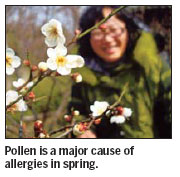Health
Trouble is in the air for allergy sufferers
Updated: 2011-04-27 08:00
By Liu Zhihua (China Daily)

The weather warms and flowers blossom during spring, a delightful season for most of us.
But for those with seasonal allergies, spring is no fun.
Huang Tiequn, an allergic respiratory disease specialist at Beijing's China-Japan Friendship Hospital, has treated many patients suffering from allergic asthma in the past few weeks.
An allergy is an abnormally high sensitivity of the body to certain substances, such as pollens, foods and micro-organisms, Huang says.
When the body's immune system overreacts to such substances, the result can be symptoms, such as red, painful or itchy skin, sneezing, runny nose, coughing, allergic conjunctivitis, nausea, vomiting and diarrhea.
Severe allergic reactions may include breathing difficulties that could be life-threatening.
Theoretically, anything alien to the body could be an allergen, and a sensitive individual could have many allergies, Huang notes.
Allergens can include medications, and dietary and environmental substances. Common allergens include penicillin, mushrooms, milk, eggs, seafood, fruits, insect stings, dust mite excreta, animal dander and pollen.
In spring, when flowers bloom and the air is full of pollen, this is a major cause of allergic asthma, Huang says.
The wide variety of freshly harvested vegetables and fruits also increases the incidence of food allergies, Huang adds, such as spinach, chives, leeks, nectarines, strawberries, pineapples and water chestnuts.
Foods rich in proteins, such as mushrooms, seaweed, shrimps and beans, are also linked with allergies.
"Once an allergy occurs, people should resort to medical treatment, in case the situation gets worse," Huang says.
Medicines such as decongestants may reduce the symptoms, but a complete cure lies in reducing the immune system's sensitivity to the allergens. Immunotherapy, for instance, or desensitization, works in this way.
When one allergen is identified, the patient will receive injections of progressively larger doses of the allergen. Over time, the patient will develop a resistance to the allergen.
"It is like how the body gets accustomed to alcohol. Drink more, and your body's alcohol tolerance will increase," Huang explains.
Such treatments are most effective for skin allergies and allergic asthma, while it is less useful with food allergies. Professionals must supervise the treatment.
"The most feasible way to protect against an allergy is to avoid direct contact with allergens," Huang says.
Stay away from places with a lot of plants during spring and summer; and take protective measures, such as wearing a mask, when it is unavoidable to go out, Huang suggests.
The doctor also warns that people can become allergic to something that they were previously not allergic to, with the change of their immune system caused by stress, fatigue and aging.
Therefore, a healthy lifestyle, such as exercising regularly and keeping good hygiene habits, may help avoid allergies, Huang suggests.
China Daily
Specials

Sino-US Dialogue
China and the US hold the third round of the Strategic and Economic Dialogue from May 9-10 in Washington.

V-Day parade
A military parade marking the 66th anniversary of the Soviet victory over Nazi.

Revolutionary marriage
A newlywed couple sings revolutionary songs during their marriage.